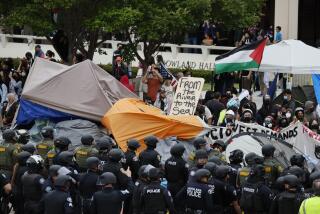Janet Napolitano confirmed by regents as head of UC system

SAN FRANCISCO — The UC regents Thursday confirmed U.S. Secretary of Homeland Security Janet Napolitano as the next president of the 10-campus system during a meeting interrupted by protesters who contended that she should be disqualified because her agency expanded deportations of people who entered the country illegally.
The regents set Napolitano’s base salary at $570,000 a year, which at her request is $21,000 less than the pay for current UC President Mark G. Yudof. That avoids a political furor about executive pay inflation, but it still will be a big raise from Napolitano’s annual Cabinet salary of about $200,000. She also will receive free housing in a UC-leased house, $8,916 a year for car expenses and $142,500 for one-time relocation costs.
After the vote, the first woman president in UC’s 145-year history said she was humbled by her new job and described UC as “the backbone of this state and a beacon for the nation and the world.”
She promised to take suggestions from regents, students, faculty and state politicians on how to improve the university.
“Perhaps the most important things I will bring with me to California are my ears. I have much to learn about the University of California and I plan to listen,” said Napolitano, who previously was governor of Arizona.
She noted that Yudof led UC through “some incredibly difficult times” in the recession and to a more solid footing thanks to voter-approved tax increases. “Now stabilized, it is time to push forward. We must push ourselves and our institution to think even more broadly, to do more, to challenge ourselves at every turn,” she said.
Napolitano, 55, was not yet present during the noisy demonstration by protesters who said her federal department’s role in deportations makes some students worried about their future in UC. Six of the 25 or so protesters were arrested and later released in the incident, which stopped the regents’ proceedings at UC San Francisco for about 15 minutes.
In her statement and at a brief news conference, Napolitano emphasized that she was a strong advocate for immigration reform with a path for citizenship. She said she helped craft the Obama administration’s action to stop deportations of young people who were brought into the country illegally as children. She said she wanted UC to be “a welcoming place” for all students, including immigrants.
The regents’ student representative, Cinthia Flores, cast the only vote against Napolitano, saying that too many people live in daily fear of deportation because of federal policies. “I will not deny the pain and experiences of countless students and their families,” said Flores, a UC Irvine law student.
Regent Sherry Lansing, who chaired the 10-member search committee, sought to counter criticism that its tightly held secrecy prevented a public vetting of other, perhaps better, candidates. A more open process would have scared away many qualified potential nominees, she said, although she declined to say who the runners-up were.
UC officials acknowledge that Napolitano is an unusual choice because she is the first non-academic to run UC and only the second, after Yudof, with no prior connection to the system. (She graduated from Santa Clara University in Northern California and attended University of Virginia law school.)
But they say her managerial skill as Arizona attorney general and governor and at the enormous Homeland Security department equips her to run UC, which enrolls about 230,000 students, employs more than 200,000 faculty and staff, has five medical centers and administers three federal labs for energy and weapons research.
“We looked at conventional candidates. We looked at nonconventional candidates. We looked at women. We looked at men. We had no preconceived notions. All that we wanted was to find the very best candidate — and we have,” Lansing said.
Gov. Jerry Brown, who sits on the regents board and has been pressing UC to add more online classes and improve its graduation rates, missed the meeting because he is on vacation; he has expressed support for Napolitano.
Lt. Gov. Gavin Newsom, a regent and acting governor in Brown’s absence, said he admired Napolitano’s record in Arizona and Washington and emphasized that her experience with immigration issues would make her especially sensitive to the issues raised by the demonstrators. “I think we are lucky to have her and I think she is going to do an exceptionally good job,” he said.
Regent Bonnie Reiss mentioned that she initially wanted Napolitano to be paid the same as Yudof on the principle of gender equality. But Napolitano decided to take less. Regents said that it was a good symbolic move, and that her pay will be substantially less than that of leaders of comparable public universities.
Beyond base salary, her overall compensation is even lower than Yudof’s package because UC made annual payments of more than $200,000 to supplemental pension funds for him. Napolitano will not receive that, although she is eligible for the 5% in extra retirement savings that UC funds for senior managers.
Napolitano is expected to take over in late September and Yudof has said he will stay as president until then, about a month later than he originally intended, and then become a UC Berkeley law professor.
More to Read
Sign up for Essential California
The most important California stories and recommendations in your inbox every morning.
You may occasionally receive promotional content from the Los Angeles Times.











